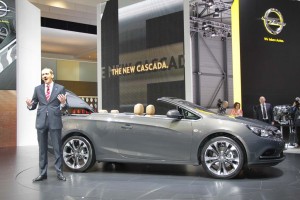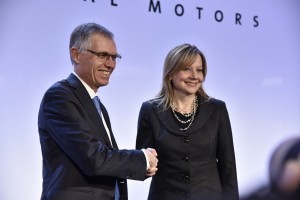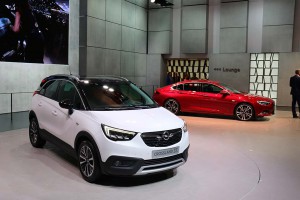Moving faster than many expected, General Motors has completed the sale of its money-losing European operations to PSA Group, the French automaker’s chairman hailing “the birth of a true European champion today.”
The sale was announced last March and marked a major shift by General Motors away from being a global brand operating in virtually every possible market to one focusing on locales where it can be sure of turning a profit. The long-troubled Opel/Vauxhall unit had last operated in the black in 1999 despite repeated turnaround efforts.
Itself running deep in the red until earlier in the decade, Parisian-based PSA, the parent of the Peugeot and Citroen brands, has delivered an unexpectedly strong turnaround of its own since the original Peugeot family gave up control of the company and Carlos Tavares was brought on board to run the company.
The 2.2 billion Euro acquisition – about $2.6 billion at the current exchange rate – will help position PSA as one of the largest automakers in Europe and a rising force in an industry increasingly dominated by giants like Toyota, Volkswagen and PSA’s French rival, the Renault-Nissan Alliance, all three of which are expected to sell more than 10 million vehicles this year. Last year, PSA sold 3.15 million vehicles worldwide, a 5.8% increase. Opel, meanwhile, saw a modest jump to 1.16 million.

Opel CEO Karl-Thomas Neumann resigned after the sale was inked and went to Audi. The Cascada, shown here, will continue to be produced by Opel for Buick.
For its part, General Motors’ global sales also hit 10 million for the first time in 2016. But the automaker’s volume for the first half of this year was just 4.7 million, well behind the industry’s Big Three leaders, and it will likely slip well under 9 million annual sales now that it has formally shed its once-powerful European operations.
(Who is in the sales lead for the first half of 2017? Click Here to find out.)
Since being named GM CEO in December 2013 – and subsequently promoted to chairman – Mary Barra has taken a hard-nosed approach to assessing the company’s global operations. Along with selling off Opel/Vauxhall, she has pulled the Detroit-based maker out of Russia, as well as South Africa while shutting down the company’s Indian dealer network – though GM will continue to operate several assembly plants there.
That’s not to say the company is giving up on growth. GM has simply decided to focus on markets where it can do so profitably. Most notably, it has invested billions of dollars in its Chinese operations. It is in a tight race with Volkswagen for dominance in what is now the world’s largest automotive market, and Chinese motorists now buy more GM vehicles each year than American drivers.
As for PSA, the sale frames Tavares as one of the industry’s comeback kings, having delivered a massive turnaround since joining the French carmaker barely a month before Barra was elevated to CEO at GM. The Portugese-born executive now has positioned PSA as a more powerful rival to France’s larger Renault – where Tavares had previously served as second-in-command to Carlos Ghosn, another industry turnaround legend.
Whether Tavares can do better than GM did with Opel/Vauxhall is far from certain, though it does help to be taking over as the European car market is in recovery after a long and painful recession. Meanwhile, Opel has shown momentum with some of its more recent products, such as the little Adam, as well as the updated Insignia model unveiled during the Geneva Motor Show in March, just a day after the sale was announced.
“We will assist Opel and Vauxhall’s return to profitability and aim to set new benchmarks together,” the PSA CEO said in a statement.
The deal required approval by European regulators and PSA officials emphasized all along that they would not engage in wholesale job cuts and manufacturing dislocation in the turnaround bid. “Opel will remain German, and Vauxhall will remain British, Tavares asserted.
That said, the new owner quickly moved to insert its own management team at the Opel/Vauxhall headquarters in Germany. Several PSA executives will step in to replace GM managers. That includes Remi Girardon as Vice President of Manufacturing, and Philippe de Rovira as new Chief Financial Officer. PSA said it is planning a “much leaner” management structure for its new subsidiary.
In a statement, PSA laid out a goal of generating positive operational free cash flow by 2020. It is targeting a 2% margin that year, with a goal of boosting margins to 6% by 2026.
GM got reason to feel good about the sale when it announced last week another $800 million quarterly loss on its European operations – though that figure included some one-time costs connected to the PSA acquisition.
(GM earnings tumble for Q2. Click Here for more.)
GM has run Opel since acquiring the company in 1929 and, in reality, the Detroit maker will retain some connections to the German brand for at least the next few years. A number of its platforms – and components – will be used for Opel and Vauxhall products at least until they are redesigned by PSA. In turn, the French maker has promised to continue building some vehicle lines in Germany that are sold in the U.S., such as Opel Cascada convertible. That arrangement is expected to run at least until 2019.
Meanwhile, PSA and GM continue to operate a series of three joint projects covering such things as component purchasing. But that has been sharply scaled back from the broader alliance the two originally envisioned in 2012. At that time they discussed the possibility of together developing as many as 40 different vehicles for sale through their various brands – including some Opel/Vauxhall models.
(Opel chief Neumann heads back to VW. Click Here for the story.)



I predict that Opel/Vauxhall will flourish with GM out of the picture.